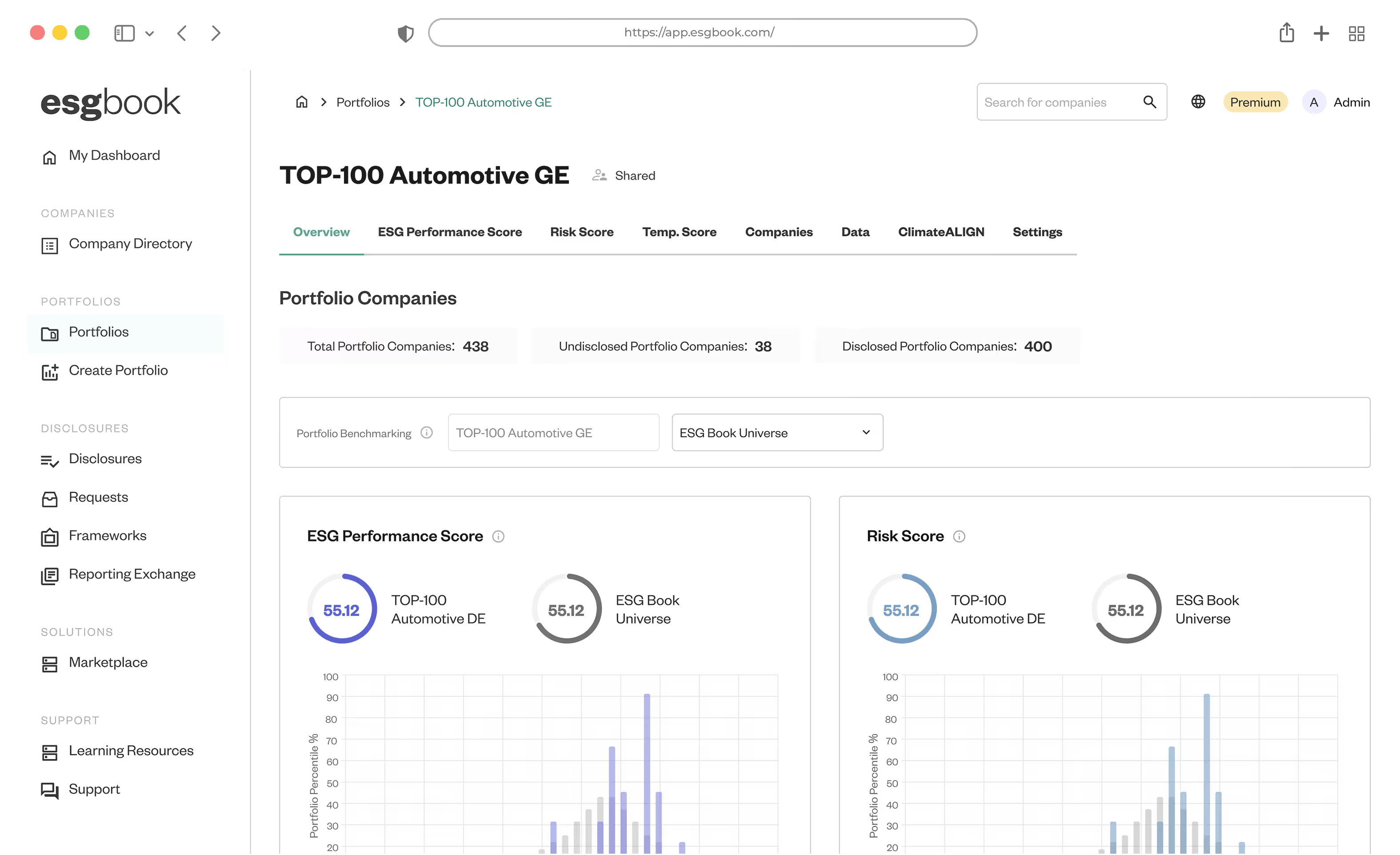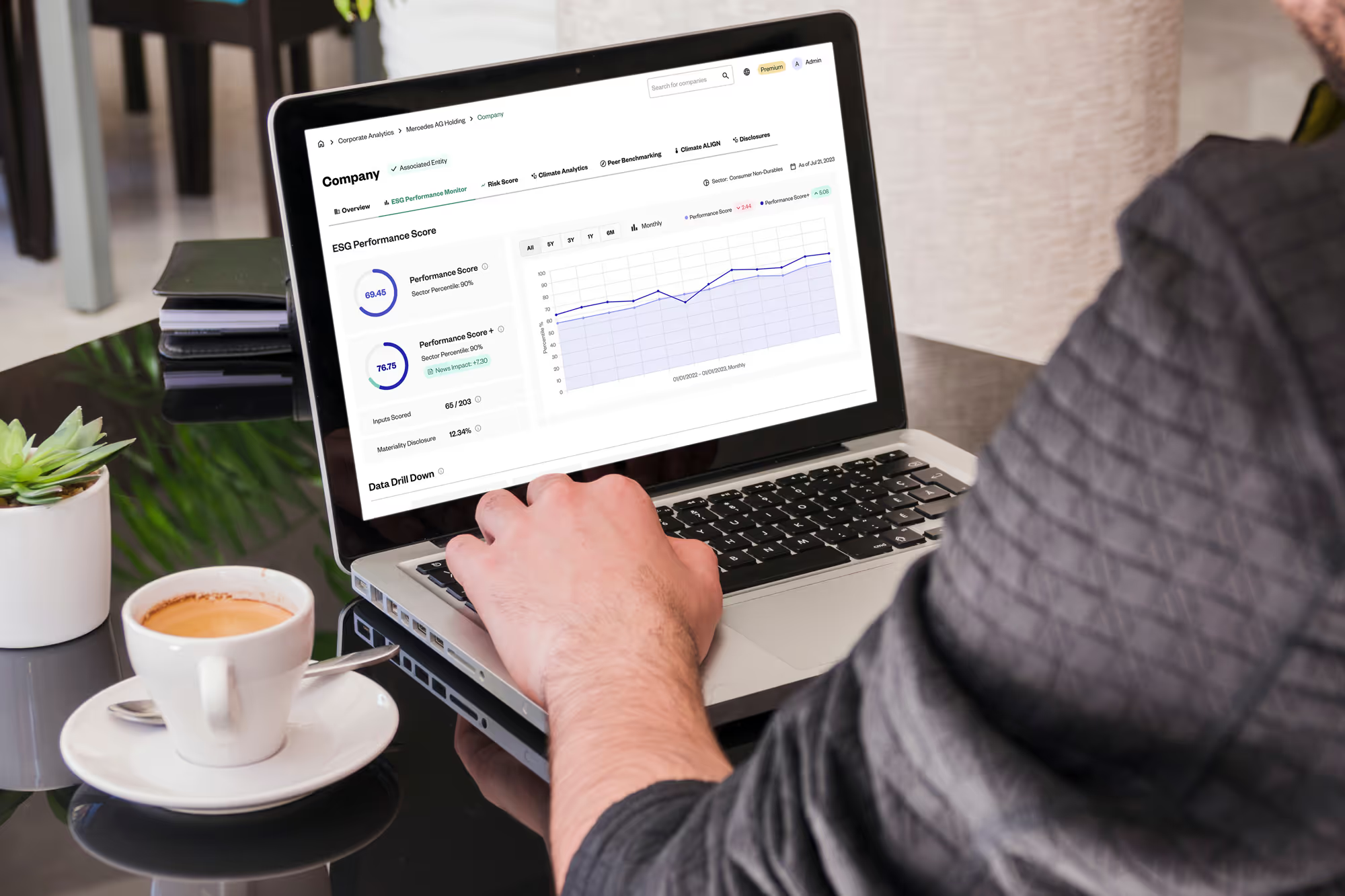Data and Analytics
As regulations tighten, businesses need reliable data for risk management, compliance, and competitiveness. ESG Book covers 95% of global market cap with emissions data for 40,000+ companies, providing analytics that enhance transparency, efficiency, and long-term value.

Explore Our Solutions:
Climate
ESG Book’s integrated, easy-to-use climate data solutions eliminate the costly, manual effort of meeting reporting requirements including EBA Pillar 3 and Basel III. Enhance compliance, accelerate decarbonisation, and simplify climate data measurement and reporting.
Estimated Emissions Model

An estimated 80% of emissions globally are classified as Scope 3, yet large data gaps hinder accurate risk assessments.
ESG Book’s Emissions Estimation Model bridges these gaps with trusted estimates for 45,000+ companies, supporting financed emissions calculations and metrics need for frameworks like the EU Taxonomy.
ESG Book’s Emissions Estimation Model bridges these gaps with trusted estimates for 45,000+ companies, supporting financed emissions calculations and metrics need for frameworks like the EU Taxonomy.
Features
Advanced Machine Learning for Transparency
Gain enhanced transparency into global corporate emissions with ESG Book's advanced machine learning-powered Estimation Model.
Comprehensive Global Coverage
Access comprehensive coverage, including 99% of top global indices, ensuring insights into Scope 1, 2, and 3 emissions for each company.
Industry-Leading Accuracy
Rely on independent, industry-leading models and the latest research for most accurate and up-to-date emissions data.
Gain enhanced transparency into global corporate emissions with ESG Book's advanced machine learning-powered Estimation Model.
Comprehensive Global Coverage
Access comprehensive coverage, including 99% of top global indices, ensuring insights into Scope 1, 2, and 3 emissions for each company.
Industry-Leading Accuracy
Rely on independent, industry-leading models and the latest research for most accurate and up-to-date emissions data.
Use Cases
ESG Book’s Emissions Estimation Model supports a range of use cases for financial institutions, corporates, and investors:
Benchmarking
Effortlessly measure and manage performance across globally adopted frameworks, comparing industry peers from high-level and topic-specific perspectives.
Simplified Financed Emissions
Apply PCAF-recommended practices to analyse emissions data from 45,000+ companies, enhancing climate impact assessments.
Risk Management
Quantify climate risk in holdings, supporting stress testing and improving analytics for stronger risk management.
Cost-Efficient Compliance
Reduce the compliance burden by mapping emissions reporting to widely adopted frameworks, saving time and costs.
Decarbonisation Analytics
Efficiently meet regulatory requirements including EBA Pillar 3 and Basel III with ESG Book's decarbonisation analytics. Gain deep insights into companies' decarbonisation progress, backed by 10+ years of historical data, integrating both reported and estimated emissions for unmatched transparency and accuracy.

Use Cases
ESG Book’s decarbonisation analytics deliver data-driven insights to efficiently track, manage, and reduce carbon emissions.
Emissions Reporting Quality
Assess and improve emissions reporting, focusing on material Scope 3 gaps to support compliance and reduce manual effort.
Net Zero Alignment
Track progress towards Net Zero goals using Implied Temperature Rise (ITR) analytics, simplifying the process of assessing target alignment.
Risk Management
Quantify climate risk in holdings and support stress testing, reducing the complexity of meeting EBA Pillar 3 and Basel III requirements.
Engagement & Reporting
Identify companies with poor emissions reporting or Net Zero alignment for targeted engagement, ensuring faster compliance with regulatory standards.
Performance & Risk
Leverage ESG Book’s data and analytics suite to efficiently manage sustainability risks, ensure regulatory compliance, and drive performance with enterprise grade, globally aligned data - while saving time and reducing costs.
Standardised and Derived Data
The ESG Performance Score offers an ISSB-aligned, rules-based evaluation of a company's sustainability progress, providing a transparent view of material performance.
Use Cases
With nearly 500 metrics per company, ESG Book helps streamline compliance with global baseline standards including ISSB while enhancing risk analysis.
EU Taxonomy Reporting
Simplify EU Taxonomy compliance with fully aligned standardised data.
Data Drill Down
Instantly access verified source documentation behind each metric, ensuring full transparency for accurate and reliable reporting.
Integrate with Ease
Integrate data seamlessly via direct feeds, bulk downloads, or ESG Book’s distribution channels.
Benchmark Performance
Easily compare sustainability performance across companies, industries, and regions to identify risks and opportunities.
ESG Performance Score
The ESG Performance Score offers an ISSB-aligned, rules-based evaluation of a company's sustainability progress, providing a transparent view of material performance.
Two analytics for each company measure historic and real-time performance:
- ESG Performance Score Core: A point-in-time score based on publicly available data, reflecting a company’s longer term sustainability performance.
- ESG Performance Score Plus: Enhanced scores that incorporate media and NGO coverage, offering insights into public perception and its impact on sustainability performance.

Use Cases
Track key issues across companies with 5+ years' data, and access underlying source information for deeper insights and accountability.
Enhance Regulatory Reporting
Use ESG Performance Scores to simplify and strengthen sustainability reporting, ensuring compliance with key frameworks like GRI, ISSB, and the EU Taxonomy.
Identify and Mitigate Risks
Quickly uncover potential risks in areas such as board oversight, transparency, and disclosed targets.
Benchmark Performance
Conduct sector- and industry-specific benchmarking to identify improvement areas and align with best practices.
Access Source Data
Gain full transparency by easily accessing verified source documentation, ensuring accurate analysis and reporting.
Risk Score

ESG Book’s Risk Score simplifies sustainability risk assessment, cutting complexity and costs. Based on UN Global Compact principles, the Risk Score evaluates corporate exposure by combining management strategies, performance data, and incident tracking, delivering actionable insights for better decision-making.
Access two key analytics across corporates to efficiently measure financially material risk factors:
Risk Score Core
A real-time score assessing exposure to corporate conduct principles, based on publicly available data.
Risk Score Plus
Enhanced scores incorporating media and NGO coverage, adjusting for public perception and its impact on sustainability risk.
Use Cases
Make corporate risk management more efficient with ESG Book's Risk Score analytics.
Identify Supply Chain Risks
Quickly identify reputational risks across suppliers and vendors, measuring risks in decision-making such as supplier selection to mitigate negative impacts.
Third-Party Risk Screening
Efficiently assess risks in procurement processes and partnerships by screening companies against corporate conduct principles and incident data.
Reporting Gap Analysis
Easily identify data reporting gaps to meet mandatory reporting requirements for global baseline standards.
Portfolio Risk Assessment
Manage risks across investment portfolios, identifying high-risk holdings and ensuring alignment with critical regulations.
Business Involvement Filter
Assessing a company's revenues and business activities for due diligence and reporting is complex and time-consuming. ESG Book simplifies this process with standardised, transparent data on revenue segmentation and business involvement across key sustainability themes.

Covering 30,000+ companies, the Business Involvement Filter provides easy access to two types of data:
- Revenue Breakdown Data: Track a company’s reported revenue for insights into financial performance.
- Business Involvement Data: Monitor a company’s products and services for comprehensive coverage of its activities.
Use Cases
Use ESG Book’s Business Involvement Filter to screen companies, track corporate revenues, and mitigate risks efficiently.
Support Compliance
Align due diligence processes with frameworks including the EU Taxonomy to simplify reporting and risk management requirements.
Assess Supply Chain Risks
Evaluate vendors’ business activities to identify potential sustainability risks, and maintain responsible sourcing practices.
Enhance Monitoring
Quickly assess new and existing clients or vendors against internal policies, reducing manual effort and due diligence costs.
Screen Activities
Clearly identify exposure to certain industries or restricted sectors based on sustainability strategies.
Corporate Solutions
ESG Book's platform centralises sustainability disclosures and data, saving time, reducing costs, and ensuring compliance. With seamless access to critical insights, companies can simplify risk management and reporting - freeing resources to drive performance.
Simplify Regulatory Reporting
ESG Book simplifies compliance, reduces the reporting burden, and accelerates alignment with global regulations.
Use Cases
Leverage a single platform to streamline reporting and disclosure requirements from multiple stakeholders, saving time and reducing costs.
Stay Compliant
Access 3,000+ regulations, 1,800 reporting indicators, and real-time regulatory trackers.
Reduce Manual Work
Use pre-filled data to automate disclosures and cut reporting time.
Control & Share Data
Manage access and securely share privileged data without lengthy questionnaires.
Adapt with Confidence
Identify requirements across 80+ jurisdictions and stay ahead of evolving standards.
Deep Dive into Performance
ESG Book’s data drill-down feature reveals the key drivers behind scores, enabling deeper gap analysis and targeted improvements for stronger stakeholder and regulatory reporting.
Use Cases:
Use ESG Book’s platform to access underlying data, enhance transparency, ensure accuracy, and take control of sustainability reporting and risk management.
Eliminate Blind Spots
Dive easily into the source documentation behind scores to identify gaps and areas for improvement.
Focus on What Matters
Pinpoint financially material topics to refine sustainability strategies and meet stakeholder expectations.
Turn Data into Action
Leverage transparent, unbiased scoring methodologies for informed decision-making.
Ensure Reporting Confidence
Input verified data directly into the platform to enhance disclosure accuracy and credibility.
Benchmark Against Peers
ESG Book helps companies benchmark sustainability performance by providing real-time, comparable data that aligns with global standards.
Use Cases:
Measure performance against peers, identify gaps, and stay ahead of regulatory expectations - efficiently and cost-effectively.
Compare with Precision
Customise peer groups for targeted sustainability and climate performance analysis.
Gain Competitive Insights
Evaluate top-level and thematic scores across multiple companies.
Spot Gaps & Opportunities
Use scores, percentiles, and raw data to uncover areas for improvement.
Ensure Regulatory Alignment:
Benchmark disclosures against industry standards to meet evolving compliance requirements.






